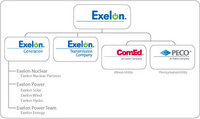Exelon CEO John Rowe Calls on Congress to "Do No Harm" as the Nation Transitions to an Economic Clean Energy Future
WASHINGTON--March 8, 2011: In a policy address hosted by the American Enterprise Institute today, Exelon Chairman and CEO John W. Rowe said that no additional federal legislation is necessary to drive the nation's transition to an economic clean energy future. Rowe said the combination of abundant natural gas, well-functioning energy markets, and EPA enforcement of the Clean Air Act is already working to modernize the nation's electric generation fleet, improve air quality, manage costs and increase global competitiveness.
“When cleaner coal, wind, solar and new nuclear are forced into the market through mandates, they create an uneconomic, unfair playing field. It not only costs electric customers more, it also adds to the federal debt.”
"Congress and the states, in well-intended efforts to clean the electric generation fleet, have enacted and proposed bills that would burden consumers, cripple markets and increase the federal debt, while doing little for air quality and nothing for the nation's competitive position," Rowe said. "I'm asking that Congress do nothing."
Rowe said the United States already has the basic clean energy tools it needs, most notably natural gas, which has recently become domestically abundant and relatively inexpensive. He believes natural gas can make great advances in affordably cleaning up the country's electricity generation fleet and enhancing our national security. But energy policy driven by mandates and subsidies for the most expensive forms of generation: such as new nuclear, cleaner coal, gas, wind, solar and other renewables--makes consumers pay more than they should.
"Cheap natural gas allows the energy market to work and technologies to compete without introducing new market distortions," Rowe said. "When cleaner coal, wind, solar and new nuclear are forced into the market through mandates, they create an uneconomic, unfair playing field. It not only costs electric customers more, it also adds to the federal debt."
He emphasized that Congress should not stop the EPA from enforcing the Clean Air Act, a law that has had strong bipartisan support for the past 40 years. Rowe also pointed out that the rules EPA is proposing are based on existing law, so they are neither new nor unexpected.
"EPA's rules will level the playing field by putting a price on the cost of air pollution, which will put those companies that have not modernized their plants on par with those who have. By reflecting these costs, the market will pick the most inexpensive technologies to clean up the stack," Rowe said. "The rules will affect only the smallest, oldest and most inefficient coal plants because they will no longer be able to compete with today's newer, cleaner electricity generation."
Chicago-based Exelon is moving forward with its own efforts to achieve a clean energy future through Exelon 2020, its plan to effectively eliminate the equivalent of the company's entire 2001 carbon footprint by 2020. Exelon is now halfway to the goal, equal to taking about 1.5 million cars off the road every year.
Rowe is the electricity industry's longest-serving chief executive, with 27 years as a utility CEO. He was among the first CEOs in the industry to focus on climate change, first testifying before Congress on the potential effects of carbon emissions in 1992. Rowe is the past chairman of the Nuclear Energy Institute and the Edison Electric Institute. He was co-chairman of the National Commission on Energy Policy and serves on the Secretary of Energy's Blue Ribbon Commission on America's Nuclear Future, a panel to provide recommendations on managing used nuclear fuel and waste.
Rowe was the featured speaker today at the American Enterprise Institute, a private, nonpartisan, not-for-profit institution dedicated to research and education on issues of government, politics, economics, and social welfare. Founded in 1943, AEI is a community of scholars and supporters committed to expanding liberty, increasing individual opportunity, and strengthening free enterprise.
Rowe's prepared remarks are available on the Exelon website at Exelon Newsroom Speechs. A video of Rowe's speech will be available starting March 9 at AEI Event.
Exelon Corporation is one of the nation's largest electric utilities with more than $18 billion in annual revenues. The company has one of the industry's largest portfolios of electricity generation capacity, with a nationwide reach and strong positions in the Midwest and Mid-Atlantic. Exelon distributes electricity to approximately 5.4 million customers in northern Illinois and southeastern Pennsylvania and natural gas to approximately 490,000 customers in the Philadelphia area. Exelon is headquartered in Chicago and trades on the NYSE under the ticker EXC.



